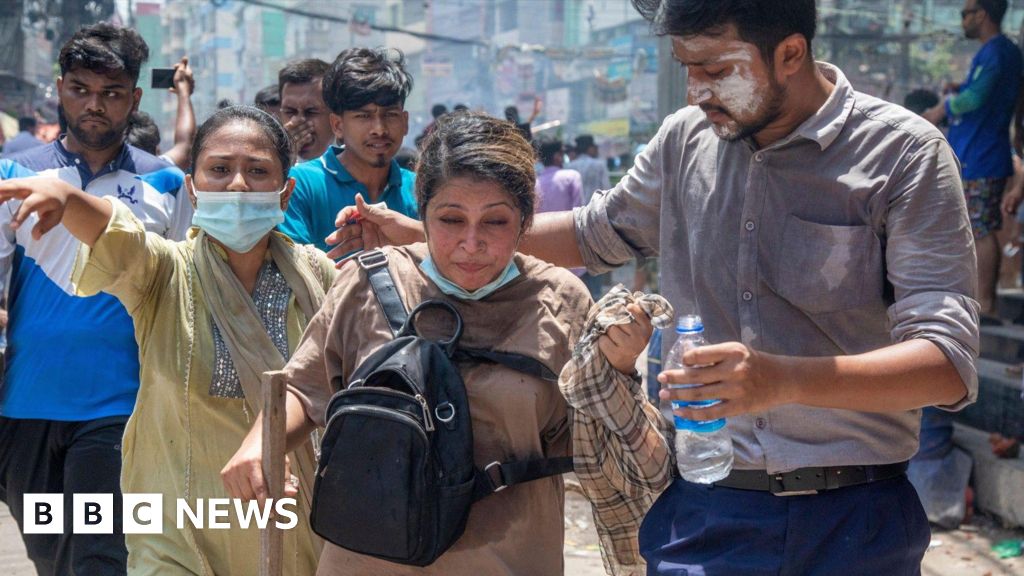- author, Ethirajan Anbarasan and Yogita Limae (London and Delhi)
- role, BBC News
Bangladesh authorities have imposed a nationwide curfew after further violence in the capital Dhaka left 35 more people dead.
The days-long violence began with students demanding the repeal of a government rule reserving a large number of civil service jobs for the families of veterans of the 1971 War of Independence.
The Chief Minister’s Office announced the night curfew following the attack on Narsingdi Jail on Friday which led to the release of hundreds of inmates.
Government spokesman Naeemul Islam Khan said troops would be sent to the streets to restore order.
“The government has decided to impose a curfew and deploy the military to support the civilian authorities,” he said in a statement.
Some 67 people have been killed since the unrest began, but the exact death toll is difficult to calculate due to a near-total communications cutoff, with mobile internet and telephone lines reportedly down.
Bus and train services were reportedly suspended and pictures from Dhaka showed large numbers of police in riot gear on the streets.
Schools and universities across Bangladesh have also been closed until further notice.
But this did little to stop the protesters, who vowed to continue their own “total lockdown”, blocking roads across the city.
On Friday, many parents joined students chanting “merit, merit” and “we will not let the blood of our brothers go in vain” outside Dhaka University.
Students argue the quota system is discriminatory and want merit-based recruitment, which critics say unfairly benefits families of pro-government groups backing Prime Minister Sheikh Hasina, who won a fourth election in January.
The demonstrations, organised by Islamist parties, were met with tear gas, rubber bullets and stun grenades.
Protesters also stormed the Narsingdi District Jail on Friday, sending hundreds of inmates reportedly fleeing onto the streets. Witnesses confirmed the incident to BBC Bangladesh.
The main opposition Bangladesh Nationalist Party has also called for protests, and its interim chairman, Tarique Rahman, who is in exile, urged people in a Twitter post to support “these kind-hearted students”.
The party said one of its leaders, Ruhul Kabir Rizvi Ahmed, had been detained. Police did not give a reason for Rizvi’s arrest.
Attempts to end the protests through talks have so far failed.
Law Minister Anisul Haq told BBC Bangladesh the government was ready to discuss the issue. “They are also discussing whether they will attend the talks or not.”
But student Nahid Iqbal told the BBC on Thursday he was not currently considering taking part in the talks.
“The government has killed so many people in one day that it cannot engage in any discussion at this stage.”
Earlier, Dhaka Metropolitan Police Commissioner Shafiqul Islam told the BBC that authorities had decided to ban public gatherings in the city to protect lives and property following Thursday’s violence.
Meanwhile, police confirmed to BBC Bangla that two people were killed on Friday.
Police said on Thursday that 100 officers were injured, and a government minister said several vehicles parked outside government buildings had been set on fire.
Clashes are not limited to Dhaka, with incidents reported in 26 districts.
Protesters who occupied and set fire to state broadcaster BTV had withdrawn by Friday morning, but the station has yet to resume broadcasting.
A senior journalist told BBC Bangla that the editing room, studio and canteen were all damaged in Thursday’s fire.
Additional reporting by BBC Bangladesh


